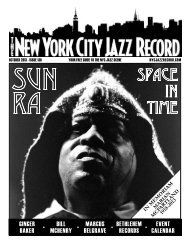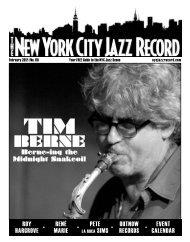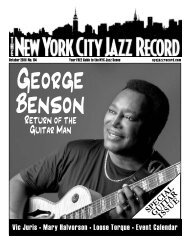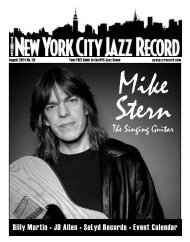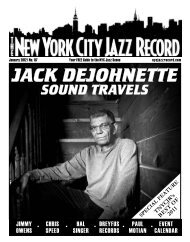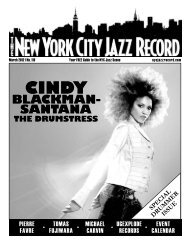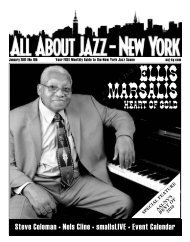September 2012 - The New York City Jazz Record
September 2012 - The New York City Jazz Record
September 2012 - The New York City Jazz Record
Create successful ePaper yourself
Turn your PDF publications into a flip-book with our unique Google optimized e-Paper software.
ENCORE<br />
Rahn Burton<br />
by Matthew Miller<br />
“I’m just amazed at<br />
the way destiny<br />
works,” Rahn Burton<br />
explained, midway<br />
through a conversation<br />
that traced his musical<br />
journey from part-time<br />
pianist in the clubs, beer halls and juke joints of ‘50s<br />
Louisville to the world stage as a long-standing<br />
member of multi-instrumentalist Rahsaan Roland<br />
Kirk’s ensemble. “I’m sure that if I had tried to plan all<br />
of this,” he continued, “it would have been a big flop.”<br />
Born in 1934, Burton’s interest in music developed<br />
early, fostered through the myriad sounds wafting<br />
from open windows throughout his community. “I<br />
asked my mother if I could take piano lessons, just so I<br />
could learn to read music - that was all I wanted to do<br />
- so I did that and it paid off.” <strong>The</strong> teenage Burton<br />
began haunting clubs like the Top Hat, one of<br />
Louisville’s premier music venues in the ‘40s-50s. By<br />
the time he completed high school, Burton was an<br />
in-demand pianist with a wide cross section of<br />
Louisville musicians. “It was a music scene,” Burton<br />
recalled with emphasis on the word “music”, “because<br />
we didn’t make any designation between <strong>Jazz</strong> and<br />
Rhythm and Blues and Gospel, you know, it was just<br />
entitled black music, or some other term.”<br />
Burton soon settled down in Louisville. “I was a<br />
mailman at the time,” he recalled, “because it never<br />
occurred to my mind that I would be able to raise a<br />
family playing music.” That would change when he<br />
heard an exciting new saxophonist on a visit to<br />
Columbus, Ohio. “He was known as Ronnie Kirk,” the<br />
pianist recalled. “He was playing with the singer Big<br />
Maybelle and they had a little jam session, so Roland<br />
got on the mic and said ‘are there any musicians who<br />
would like to come up and play?’ And I - after some<br />
apprehension - put my hand up. We played ‘Pennies<br />
From Heaven’. Nothing much was said and the next<br />
day, I drove back to Louisville.”<br />
As the pianist recalls it, destiny reasserted itself a<br />
year later when his mail route took him by the Top Hat<br />
and he recognized a familiar face. “I saw this sign in<br />
the window, ‘<strong>Jazz</strong> Phenomenon Ronnie Kirk, playing<br />
two horns at one time’ and it had a picture of him and<br />
I said ‘oh, I know him.’ I think I went probably three or<br />
four nights in the two-week stint,” Burton remembered.<br />
One night, after a late show, the pianist was hanging<br />
LEST WE FORGET<br />
Wilbur Ware (1923-79)<br />
by Donald Elfman<br />
Bassist Wilbur Ware’s art consisted of rock-solid time,<br />
natural and authoritative swing and an inspired sense<br />
of harmony. He supported many of the most original<br />
and complex soloists in bebop and beyond and did so<br />
being somehow both unflagging and flexible.<br />
He was born in Chicago on Sep. 8th, 1923. One of<br />
Ware’s earliest professional musical contacts was<br />
saxophonist Von Freeman. Ware was playing gigs<br />
around Chicago by the time he was 10 and then worked<br />
around the Midwest through his teenage years. At 15,<br />
Ware recorded with blues artist Big Bill Broonzy.<br />
After a brief stint in the military, the bassist<br />
returned to Chicago in 1946 and soon was playing with<br />
Stuff Smith, Roy Eldridge, Hot Lips Page and Sonny<br />
Stitt. Ware came to be known as a musician who loved<br />
10 <strong>September</strong> <strong>2012</strong> | THE NEW YORK CITY JAZZ RECORD<br />
around with Kirk and his band when an argument<br />
broke out. “It was a falling out over some money,” the<br />
pianist recalled, “and in the end, the band quit right in<br />
the middle of the engagement.”<br />
<strong>The</strong> band’s departure was a setback for Kirk, but a<br />
remarkable opportunity for the young Burton. “He<br />
[Kirk] asked me on the night they quit if I would go<br />
with him to Nashville, TN,” Burton recalled, “so I took<br />
a leave of absence from the Post Office and went with<br />
him.” Unfortunately, the newly formed band with<br />
Burton in the piano seat only got to play one gig in<br />
Nashville before the tour came to an abrupt end at the<br />
hands of Jim Crow, when the entire band was arrested<br />
for consorting with a group of white women. Despite<br />
the briefness of the tour, Burton made a lasting<br />
impression on Kirk and the two toured extensively<br />
throughout the ‘50s. In the early ‘60s, Burton made the<br />
move to <strong>New</strong> <strong>York</strong> <strong>City</strong> after the Kirk group recorded a<br />
session for Argo records, released as Introducing Roland<br />
Kirk (1960).<br />
Following a string of well-received gigs in <strong>New</strong><br />
<strong>York</strong>, Kirk left for Europe without the band and Burton<br />
was back to a freelance life. “I played with a guy named<br />
Chris Powell in Syracuse before heading back to<br />
Louisville,” the pianist explained, to work with touring<br />
musicians coming through town. One of those was the<br />
great saxophonist George Adams, who enlisted Burton<br />
in his band and convinced him to move to Atlanta in<br />
the mid ‘60s. By 1968, Burton was back in <strong>New</strong> <strong>York</strong><br />
<strong>City</strong> and “got a call from Rahsaan Roland Kirk to come<br />
to Kongsberg, Norway to play with him. After that<br />
tour, I was a member of the nucleus of his rhythm<br />
section with the bassist Steve Novosel and drummer<br />
Jimmy Hopps.” As a core member of Kirk’s band well<br />
into the ‘70s, Burton recorded on seminal Kirk albums<br />
like Volunteered Slavery, <strong>The</strong> Inflated Tear and others.<br />
Following the extended stint with Kirk, Burton<br />
returned to <strong>New</strong> <strong>York</strong> to play with Marvin Hannibal<br />
Peterson, Beaver Harris, Michael Carvin, Charlie<br />
Rouse, Archie Shepp and Art Blakey among other jazz<br />
luminaries over the ensuing decades. <strong>The</strong> pianist also<br />
began leading ensembles, including a group with<br />
bassist Walter Booker and drummer Jimmy Cobb that<br />
recorded the pianist’s stunning album <strong>The</strong> Poem.<br />
After more than 40 years, Burton continues to call<br />
<strong>New</strong> <strong>York</strong> home, spreading the jazz gospel with every<br />
bracing run and propulsive phrase. “Nothing will ever<br />
take away from my desire and love for the music,<br />
because I know the importance of it,” Burton intoned.<br />
“That’s enough for me.” v<br />
Burton is at Cleopatra’s Needle Sep. 29th and 449 Lounge<br />
Thursdays, Saturdays and the third Sunday of each month.<br />
to play and sit in with bands whenever he got the<br />
chance. His enthusiasm and tenacity earned a spot<br />
leading the house band at the famous Beehive Club.<br />
In 1955 Ware first performed with <strong>The</strong>lonious<br />
Monk. This led to an association in the later ‘50s with<br />
the pianist - notable is the 1957 live recording at the<br />
Five Spot for Riverside - as well as work on the Blue<br />
Note label with Sonny Rollins and others. It was during<br />
this period that there was some question about Ware’s<br />
reliability (there were drug issues) but he did make it<br />
for the Great Day in Harlem photo shoot in 1958.<br />
<strong>The</strong> early ‘60s seemed promising - the bassist<br />
played with Kenny Dorham, in a group led by Charles<br />
Mingus, with John Coltrane and Eric Dolphy and with<br />
a number of the avant garders including Albert Ayler<br />
and Don Cherry - but moved back to Chicago in 1963<br />
to contend with tuberculosis. His poor health -<br />
aggravated, it seems, by his drug use - kept him off the<br />
scene for much of 1963-68.<br />
By 1968, Ware was back, meeting up with some of<br />
See Calendar and Regular Engagements.<br />
Recommended Listening:<br />
• Roland Kirk - Introducing Roland Kirk<br />
(and featuring Ira Sullivan) (Chess-GRP, 1960)<br />
• Roland Kirk - <strong>The</strong> Inflated Tear (Atlantic, 1967)<br />
• Dick Griffin - <strong>The</strong> Eighth Wonder (Strata-East, 1974)<br />
• Beaver Harris 360 Degree Music Experience -<br />
Beautiful Africa (Soul Note, 1979)<br />
• Rahn Burton Trio - <strong>The</strong> Poem (DIW, 1992)<br />
• Michael Marcus - Sunwheels (Justin Time, 2000)<br />
<strong>September</strong> 11th<br />
Russ Kassoff Orchestra<br />
with Catherine Dupuis<br />
<strong>September</strong> 18th<br />
Warren Chiasson<br />
<strong>September</strong> 25th<br />
Santi Debriano Quartet<br />
<strong>New</strong> <strong>York</strong> Baha’i Center<br />
53 E. 11th Street<br />
(between University Place and Broadway)<br />
Shows: 8:00 & 9:30 PM<br />
Gen Adm: $15 Students $10<br />
212-222-5159<br />
bahainyc.org/nyc-bahai-center/jazz-night<br />
Chicago’s <strong>New</strong> Music folks - Andrew Hill, Roscoe<br />
Mitchell, Thurman Barker - and then moving to <strong>New</strong><br />
<strong>York</strong> where he joined Archie Shepp’s group. He also<br />
worked with Clifford Jordan, Elvin Jones, Philly Joe<br />
Jones and Hank Mobley. As the ‘60s closed, Ware found<br />
it harder to get work; some, including Ware himself,<br />
noted that his inability to read was the root of the<br />
problem. He moved to Philadelphia in 1972 and did<br />
some work with members of Sun Ra’s Arkestra but he<br />
had an advancing case of emphysema and, on Sep. 9th,<br />
1979, died in the Germantown section of Philadelphia.<br />
<strong>The</strong> encyclopedia of great names Ware played<br />
with attests to his brilliance. Listen to his playing with<br />
Rollins (Blue Note) to Monk (Riverside) or Chicago<br />
Sound (Riverside), his leader debut. <strong>The</strong> bassist’s<br />
second session as a leader, a 1968 date with Clifford<br />
Jordan, Don Cherry and Ed Blackwell, will be released<br />
for the first time this month. v<br />
A Ware Tribute is at Merkin Hall Sep. 8th. See Calendar.



